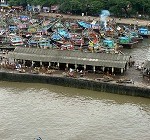26 November should be declared a National Day of Remembrance. Not a holiday, but a day of formalised debate and informed discussions for seminal review and introspection on what happened that day in Mumbai, what has been done to prevent a repeat and what needs to be done to create a robust response that is unified yet decentralised.
A cursory glance and even a detailed study will reveal that barring ineffective notional changes, Mumbai is still a sitting duck, awaiting a repeat disaster. It could be any or all of these – terrorism from the sea or land, maritime disaster in the form of a tanker collision, oil rig collapse, oil pollution, monsoon mayhem at sea and at shore. In every case we will still only react instead of responding in an organised manner. Of course there have been improvements to the systems, but those are mostly ad hoc and piece-meal. Neither our authorities nor our public has the determination to pre-empt or manage a crisis effectively. Mumbaikars passively hope that nothing will happen and if it does, they will muddle through as usual.
Mumbai is a megapolis of admirable accommodation by its citizens. Most people are ‘sea blind’ – i.e. blissfully unaware of the sea that surrounds them, save a vista to be admired or a beach in which to immerse their toes. In contrast, to those connected with matters maritime, the complexities of its management, the immense economic potential, the porusness of its coastline, the maritime security challenges and the fiscal impact of any sea-borne crisis is obvious. Three years after the attack, we are nowhere near a formalised Maritime Governance Code, which can put an end to the current compartmentalisation and lack of coordination. It calls for the state government, Navy, Coast Guard, police, Port Trusts and other mercantile marine agencies to set up a maritime governance centre. It will make Maharashtra, and Mumbai, India’s financial capital, a pioneer in the country.
What is maritime governance? It is the coordination of all maritime activities with a constant, collective awareness of the surrounding maritime domain. It will require the various agencies like the Navy and coast guard, along with support from the police, customs and port trust, to create and deploy standard operating procedures. The mercantile marine department can be chartered with merchant vessel management together with the shipping companies, stevedores, etc. The MGC- Maritime Governance Centre – will be responsible for the oversight of all sea-going activities and make sure the stakeholders have available and ready with them, the checklist of required resources.
Models to follow are AMVERS Automated Mutual-Assistance Vessel Rescue System of the US Coast Guard. Or France’s Prefet Maritime, a Navy Vice Admiral charged with the management of the coastal region, reporting directly to the Government. Each area has its own Maritme authority. This was created in 1800 to unify the command of the harbours and the command of the navy.
The Indian Navy has a white paper planned on Maritime Domain Awareness. A committee of secretaries has already been set up. These intentions have to be made real. In the short, medium and long term, maritime governance is the only answer for Mumbai across the span of security, commerce, trade, disaster, crisis management and fishermen/fishing fleet protection.
Vice Admiral Venkat Bharatan is a retired Admiral of the Indian Navy.
This article is part of the series “26/11: Reflections”. You can find a compilation of all the articles that are part of the series here.
This article was exclusively written for Gateway House: Indian Council on Global Relations. You can read more exclusive content here.
For interview requests with the author, or for permission to republish, please contact outreach@gatewayhouse.in.
© Copyright 2011 Gateway House: Indian Council on Global Relations. All rights reserved. Any unauthorized copying or reproduction is strictly prohibited.


